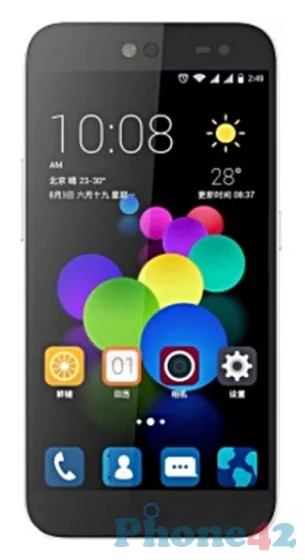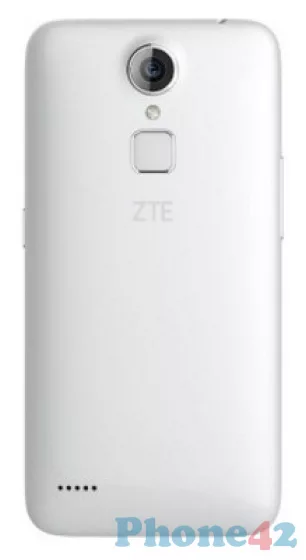
ZTE Blade A1 (2015)
This phone boasts a 5 inch IPS display, a MediaTek MT6735 chipset, and 2 GB of RAM.
Let's see what makes this device stand out!
Table of Contents
- ZTE Blade A1 specifications
- Weight, dimensions, colors
- System, chipset, performance
- Display type, size, resolution
- Memory, storage
- Cameras, flash
- Connectivity, network, wireless
- Battery type, capacity, charger
- Features, sensors, specials
- Verdict, pros and cons
This article shares our personal experiences and thoughts about using the ZTE Blade A1 smartphone. We hope to offer helpful insights to others interested in this device.

ZTE Blade A1 specifications
| Brand | ZTE |
|---|---|
| Name | Blade A1 |
| Model | BLADEA1 |
| Release date | 2015 |
Weight, dimensions, colors
| Weight | 4.83 oz |
|---|---|
| Dimensions | 5.59 x 2.76 x 0.35 inch |
| Colors | blue, gray, green, white, yellow |
| SIM type | Nano SIM |
The weight of the ZTE Blade A1 is still considered to be lightweight and portable. Smartphones use a Nano SIM as a subscriber identity module (SIM), which is a chip card.

System, chipset, performance
| OS version | Android OS v5.1 (Lollipop) |
|---|---|
| SoC | MediaTek MT6735 |
| CPU | Quad-core 1.3 GHz Cortex-A53 |
| GPU | Mali-T720 MP2 |
The ZTE Blade A1 comes with Android OS v5.1 (Lollipop) out of the box. Android is an open-source operating system. This means the source code is free to the public. The quad-core mobile CPU can provide fast and efficient performance for mobile games. Many people consider ARM Mali GPUs a good option for mobile devices.

Display type, size, resolution
| Display type | IPS |
|---|---|
| Screen size | 5 inch |
| Resolution | 720 x 1280 px |
| Multitouch support | yes |
People know IPS for its wide viewing angles. It also has accurate color reproduction. The 5 inch display make this smartphone pocket-friendly. The display size is the diagonal distance from one corner of the screen to the opposite corner.

Memory, storage
| RAM | 2 GB |
|---|---|
| Internal storage | 16 GB |
| Memory card slot | microSD |
The smartphone has 2 GB of RAM. It can run many apps at once without much lag or slowness. Having more RAM alone does not guarantee better performance. If we use our smartphones for basic tasks like calling, texting, and browsing the web, 32 GB may be sufficient for our needs. We can expand the internal storage of the Blade A1 (16 GB) by using a compatible microSD card.
Cameras, flash
| Main camera | 13 MP, 4128 x 3096 px, autofocus |
|---|---|
| Flash | LED |
| Selfie camera | 8 MP |
This single camera can be enough for many smartphone users, it depends on their photography needs and preferences. The Blade A1 does not have optical image stabilization (OIS).
Connectivity, network, wireless
| GSM 2G bands | 900 / 1800 / 1900 |
|---|---|
| Network coverage | 2G / 3G / 4G |
| Wi-Fi | Wi-Fi 802.11 b/g/n |
| Bluetooth | v4.0, A2DP |
| GPS | A-GPS |
| NFC | no |
| FM radio | yes |
| USB | microUSB 2.0 |
| Headphone | 3.5 mm jack |
The ZTE Blade A1 supports 4G/LTE networks. This ZTE phone can connect to Wi-Fi networks at home, at work, or in public places. We can use Bluetooth to connect our Blade A1 smartphone to many Bluetooth devices. This phone has a built-in GPS receiver. The phone isn't NFC (Near Field Communication) capable. NFC is not essential for basic phone functionality, but it can be useful. The 3.5 mm headphone jack allows us to connect wired headphones or earphones to the device.
Battery type, capacity, charger
| Type | Li-Ion 2800 mAh |
|---|
The Li-Ion 2800 mAh battery gives the smartphone a good battery backup. The Li-ion is a low maintenance battery. It does not need periodic full discharge. We can simply buy a new battery from the open market and interchange it by ourselves.
Features, sensors, specials
| Sensors | accelerometer, fingerprint, light, proximity |
|---|
Today, smartphones come with many sensors. They help make the user experience better. The accelerometer provides information about the smartphone's movement in three axes. These are X (horizontal), Y (vertical), and Z (depth). The fingerprint reader is a biometric security feature found in Blade A1 smartphones. The light sensor is a type of sensor in a smartphone. It lets the phone measure light intensity around the device.
Verdict, pros and cons
Every phone has its strengths and weaknesses, and this ZTE phone is no exception. As with any device, there are aspects that shine and others that fall short. By examining both sides, we can paint a complete picture of what this phone has to offer. Let's explore its standout features and areas for improvement. Remember, this is just my opinion, and yours might be different.
Pros
- microSD slot
Cons
- limited-size screen
- insufficient internal storage
- single camera setup
- no OIS function
- no 5G support
- no NFC feature
- no Type-C USB port
- low-capacity battery
- no digital compass
Please let us know if you find incorrect information or something isn't working. Also, tell us if you have a suggestion for improvement.
Updated: July 26, 2024
 I'm Lucas Bradley, the founder of the Phone42.com site. I love technology, especially smartphones, and I've been working with tech stuff for more than 20 years. This means I've seen a lot of changes and have learned a bunch about what makes a good phone. On Phone42.com, I look at all kinds of phones. They can be from big, well-known companies or new ones trying to make their mark. I want to help people understand what's new and cool in the world of smartphones, in a way that's easy to get.
I'm Lucas Bradley, the founder of the Phone42.com site. I love technology, especially smartphones, and I've been working with tech stuff for more than 20 years. This means I've seen a lot of changes and have learned a bunch about what makes a good phone. On Phone42.com, I look at all kinds of phones. They can be from big, well-known companies or new ones trying to make their mark. I want to help people understand what's new and cool in the world of smartphones, in a way that's easy to get.